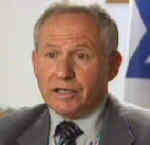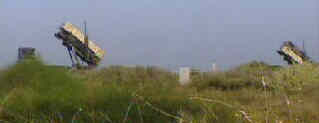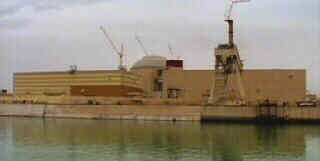Will Israel Bomb Iran
This World
The Islamic threat to Israel

Avi Dichter
Hezbollah's militants, allegedly, have support from Iran, but to
Israel, Iran poses an even more deadly threat. President Ahmadinejad has
called, publicly, for the elimination of what he terms "The Zionist
Regime".
Despite it's overwhelming military superiority, Israel still cannot
claim victory in this summer's war with Hezbollah. In the wider Middle
East, the celebrations of what is seen as Hezbollah's Islamic victory
spread from Beirut to Cairo and Tehran. But, in Israel, intelligence is
emerging of what is perceived as a far greater danger than Hezbollah.
This spring, Iran's president Mahmoud Ahmadinejad organised a
theatrical set-piece to announce a breakthrough to the world. Iran had
enriched uranium to the low grades required for reactor fuel.
Avi Dichter, the former Head of Strategy for Israel's military intelligence states:
"There's no doubt about the fact that Iran is building a nuclear
bomb. All intelligence agencies around the globe, whether it's the CIA,
MI6 or Mossad, are sharing the same information about the intention of
Iran to build an atomic bomb".
A few miles from Israel's beach front, Arrow Interceptor Rockets
stand ready to shield the country from incoming missiles.
The launch
system has, recently, been upgraded and it can now deal with the
possibility of nuclear warheads, potentially fired from Iran.
Israel is incredibly guarded about it's defence systems. For over a
decade, Israel's military has been studying Iran's research sites. They
are now convinced that, under the cover of it's peaceful nuclear energy
programme, Iran is developing atomic weapons.
Benjamin Netanyahu,
Israel's Prime Minister from 1996 to 1999 said: "A month after I
was elected I said that the greatest threat that we all faced, not just
Israel but, all of the free world, is a nuclear-armed Iran.

Interceptor Rockets stand Sentinel
Shimon Peres recounts: "In 58 years, we were attacked five times
by armies, three times by Intefadah, we were outgunned, outnumbered,
there was a danger to our existence, yet when we started our nuclear
option I told President Kennedy that it was not Israel's intention to
introduce nuclear armaments to the Middle East. That remains our policy
today".
Shimon Peres began Israel's nuclear research centre at Dimona nearly
fifty years ago. Yet it officially remains a state secret. Israel calls
it's policy "Nuclear Ambiguity". "Ambiguity is not a
bomb, ambiguity is an attitude" explained Peres.

Benjamin Netanyahu
Benjamin
Netanyahu expounds: "If an Arab or a Muslim country acquires and
wields nuclear weapons this will force realignment in the entire Middle
East, in the world in fact. Certainly, Israel will have to consider it's
long-held policies as well".
At the Rafael Missile Factory in northern Israel, the army's huge
array of conventional weapons are developed by a highly sophisticated
defence industry, boosted by over two billion dollars a year in US
subsidy to buy American arms.
Israel's fears are distilled in Iran's president, Mahmoud Ahmadinejad.
Two months into his presidency he issued a death sentence against
Israel. His words, in Farsi, were "The regime occupying Jerusalem
should be eliminated from the pages of history".
This caused widespread condemnation and calls that Iran should be
removed from the United Nations. On the streets of Israel, President
Ahmadinejad's statement was regarded as bordering on a declaration of
war.
In the past, the feeling of isolation has often led Israel to go it
alone. In 1981, Iraq was on the point of acquiring nuclear power, The
Osirak reactor was an experimental plutonium plant. The fear was it
could be made to produce weapons-grade fuel. With America, then,
supporting Saddam Hussein, Israel decided to step-in and destroy the
reactor by itself.
The Israeli air-force used it's brand new F16 fighters to spearhead
the mission, flying low along the Saudi border and taking the Iraqi
defences by surprise. In Israel it was seen that a unilateral strile
could work against a nuclear threst.
Ehud Barak, the Israeli prime minister from 1991 to 2001 remembers:
"At the time, the whole world condemned Israel for the attack. From
the Europeans to President Reagan, only to agree, years later, how
far-sighted Prime Minister Menachem Begin had been".
Bushehr, in western Iran is where the country's first nuclear reactor
is about to become operational. Iram claims that the use of atomic
technology to generate power is permitted under International treaty.
But, Israel's military elite is growing increasingly alarmed.

Iranian Nuclear Plant
Israel has monitored Iran's military ever since the 1979 revolution.
Their closest attention is now given to the series of long-range
missiles devised by Iran, based on North Korean prototypes. According to
reported Israeli intelligence, the newer version of the Shahab missile
would reach, not just Israel, but western Europe.
Javad Zarif, the Iranian Ambassador to the US says: "Iran has an
inalienable right to develop nuclear technology for peaceful purposes,
and Iran has been prepared to go out of it's way in order to ensure and
to assure the International Community that it's programme would remain
exclusively peaceful".
Israel's diplomats are not convinced. According to the Foreign
Minister, Iran is just trying to buy time, in the belief that once it
possesses nuclear weapons it will be unstoppable.

President Mahmoud Ahmadinejad
Much
depends on Israel's assessment of how far Iran has progressed at Natans,
it's heavily guarded Uranium Enrichment Centre. The plant is based on
1970's technology, bought in the 80's on the nuclear black-market. It
houses a line of centrifuges which spin uranium gas at 1,000 revolution
per second to make fuel for reactors. The more centrifuges in the line,
the quicker the gas can become weapons-grade fuel.
In some Israeli's eyes, the possibility of a nuclear attack on
Israel's cities is so horrific that the government must act to prevent
it.
In August, the Israeli press reported that the head of Israel's
air-force was masterminding the Iran Front. Their plan for a pre-emptive
strike against Iran's nuclear installations. Israel already has
squadrons of the long-range F15 and F16 fighters at bases in the Negev
desert. General Eytan Ben-Eliyahu has assessed the challenge they might
face, based on his own experience as a pilot.
Israel's pilots are armed with precision guided weapons including
huge US bunker-busting bombs designed to detonate beneath the surface
and capable of penetrating two metres of concrete.
Javad Zarif points out "Iran, for it's part, is ready to defend
itself. We're not provoking, we do not want to engage in hostilities,
but we will certainly be prepared to defend ourselves if that is imposed
on us".
If Iran is attacked and strikes back against western shipping in the
Persian Gulf, where the Iranian navy has dozens of bases, the price of
oil could be the first casualty. Many Israelis fear a concerted backlash
from the Islamic world, of which they would bear the brunt, with
Hezbollah militants renewing their rocket attacks on northern Israel.
Israel's defence ministry also thinks that Iran has powerful influence
over the militants of Islamic jihad and Hammas. Israel could face
renewed violence anywhere in the world.





